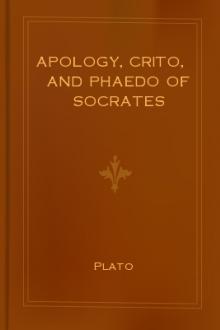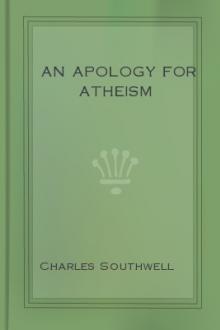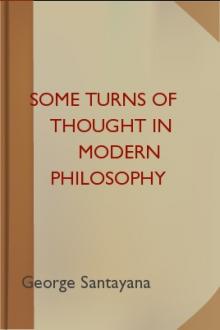Apology by Plato (best books to read for knowledge txt) 📖

- Author: Plato
- Performer: -
Book online «Apology by Plato (best books to read for knowledge txt) 📖». Author Plato
It has been remarked that the prophecy of a new generation of teachers who would rebuke and exhort the Athenian people in harsher and more violent terms was, as far as we know, never fulfilled. No inference can be drawn from this circumstance as to the probability of the words attributed to him having been actually uttered. They express the aspiration of the first martyr of philosophy, that he would leave behind him many followers, accompanied by the not unnatural feeling that they would be fiercer and more inconsiderate in their words when emancipated from his control.
The above remarks must be understood as applying with any degree of certainty to the Platonic Socrates only. For, although these or similar words may have been spoken by Socrates himself, we cannot exclude the possibility, that like so much else, e.g. the wisdom of Critias, the poem of Solon, the virtues of Charmides, they may have been due only to the imagination of Plato. The arguments of those who maintain that the Apology was composed during the process, resting on no evidence, do not require a serious refutation. Nor are the reasonings of Schleiermacher, who argues that the Platonic defence is an exact or nearly exact reproduction of the words of Socrates, partly because Plato would not have been guilty of the impiety of altering them, and also because many points of the defence might have been improved and strengthened, at all more conclusive. (See English Translation.) What effect the death of Socrates produced on the mind of Plato, we cannot certainly determine; nor can we say how he would or must have written under the circumstances. We observe that the enmity of Aristophanes to Socrates does not prevent Plato from introducing them together in the Symposium engaged in friendly intercourse. Nor is there any trace in the Dialogues of an attempt to make Anytus or Meletus personally odious in the eyes of the Athenian public.
APOLOGY byPlato
Translated by Benjamin Jowett
How you, O Athenians, have been affected by my accusers, I cannot tell; but I know that they almost made me forget who I was—so persuasively did they speak; and yet they have hardly uttered a word of truth. But of the many falsehoods told by them, there was one which quite amazed me;—I mean when they said that you should be upon your guard and not allow yourselves to be deceived by the force of my eloquence. To say this, when they were certain to be detected as soon as I opened my lips and proved myself to be anything but a great speaker, did indeed appear to me most shameless—unless by the force of eloquence they mean the force of truth; for is such is their meaning, I admit that I am eloquent. But in how different a way from theirs! Well, as I was saying, they have scarcely spoken the truth at all; but from me you shall hear the whole truth: not, however, delivered after their manner in a set oration duly ornamented with words and phrases. No, by heaven! but I shall use the words and arguments which occur to me at the moment; for I am confident in the justice of my cause (Or, I am certain that I am right in taking this course.): at my time of life I ought not to be appearing before you, O men of Athens, in the character of a juvenile orator—let no one expect it of me. And I must beg of you to grant me a favour:—If I defend myself in my accustomed manner, and you hear me using the words which I have been in the habit of using in the agora, at the tables of the money-changers, or anywhere else, I would ask you not to be surprised, and not to interrupt me on this account. For I am more than seventy years of age, and appearing now for the first time in a court of law, I am quite a stranger to the language of the place; and therefore I would have you regard me as if I were really a stranger, whom you would excuse if he spoke in his native tongue, and after the fashion of his country:—Am I making an unfair request of you? Never mind the manner, which may or may not be good; but think only of the truth of my words, and give heed to that: let the speaker speak truly and the judge decide justly.
And first, I have to reply to the older charges and to my first accusers, and then I will go on to the later ones. For of old I have had many accusers, who have accused me falsely to you during many years; and I am more afraid of them than of Anytus and his associates, who are dangerous, too, in their own way. But far more dangerous are the others, who began when you were children, and took possession of your minds with their falsehoods, telling of one Socrates, a wise man, who speculated about the heaven above, and searched into the earth beneath, and made the worse appear the better cause. The disseminators of this tale are the accusers whom I dread; for their hearers are apt to fancy that such enquirers do not believe in the existence of the gods. And they are many, and their charges against me are of ancient date, and they were made by them in the days when you were more impressible than you are now—in childhood, or it may have been in youth—and the cause when heard went by default, for there was none to answer. And hardest of all, I do not know and cannot tell the names of my accusers; unless in the chance case of a Comic poet. All who from envy and malice have persuaded you—some of them having first convinced themselves—all this class of men are most difficult to deal with; for I cannot have them up here, and cross-examine them, and therefore I must simply fight with shadows in my own defence, and argue when there is no one who answers. I will ask you then to assume with me, as I was saying, that my opponents are of two kinds; one recent, the other ancient: and I hope that you will see the propriety of my answering the latter first, for these accusations you heard long before the others, and much oftener.
Well, then, I must make my defence, and endeavour to clear away in a short time, a slander which has lasted a long time. May I succeed, if to succeed be for my good and yours, or likely to avail me in my cause! The task is not an easy one; I quite understand the nature of it. And so leaving the event with God, in obedience to the law I will now make my defence.
I will begin at the beginning, and ask what is the accusation which has given rise to the slander of me, and in fact has encouraged Meletus to proof this charge against me. Well, what do the slanderers say? They shall be my prosecutors, and I will sum up their words in an affidavit: ‘Socrates is an evil-doer, and a curious person, who searches into things under the earth and in heaven, and he makes the worse appear the better cause; and he teaches the aforesaid doctrines to others.’ Such is the nature of the accusation: it is just what you have yourselves seen in the comedy of Aristophanes (Aristoph., Clouds.), who has introduced a man whom he calls Socrates, going about and saying that he walks in air, and talking a deal of nonsense concerning matters of which I do not pretend to know either much or little—not that I mean to speak disparagingly of any one who is a student of natural philosophy. I should be very sorry if Meletus could bring so grave a charge against me. But the simple truth is, O
Athenians, that I have nothing to do with physical speculations. Very many of those here present are witnesses to the truth of this, and to them I appeal. Speak then, you who have heard me, and tell your neighbours whether any of you have ever known me hold forth in few words or in many upon such matters…You hear their answer. And from what they say of this part of the charge you will be able to judge of the truth of the rest.
As little foundation is there for the report that I am a teacher, and take money; this accusation has no more truth in it than the other. Although, if a man were really able to instruct mankind, to receive money for giving instruction would, in my opinion, be an honour to him. There is Gorgias of Leontium, and Prodicus of Ceos, and Hippias of Elis, who go the round of the cities, and are able to persuade the young men to leave their own citizens by whom they might be taught for nothing, and come to them whom they not only pay, but are thankful if they may be allowed to pay them.
There is at this time a Parian philosopher residing in Athens, of whom I have heard; and I came to hear of him in this way:—I came across a man who has spent a world of money on the Sophists, Callias, the son of Hipponicus, and knowing that he had sons, I asked him: ‘Callias,’ I said, ‘if your two sons were foals or calves, there would be no difficulty in finding some one to put over them; we should hire a trainer of horses, or a farmer probably, who would improve and perfect them in their own proper virtue and excellence; but as they are human





Comments (0)